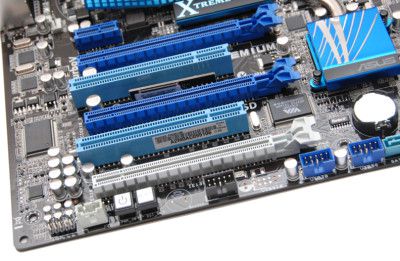The switch to pure PCI-E will only work if they provide full 8x or 16x lane card slots, none of those silly 1x slots. A 1x slot only just provides the bandwidth for a single USB3 port, sure, they're enough for a gigabit NIC or an audio card, but most people just use the onboard audio and NIC, so the number of uses that a 1x port has is significantly reduced. 4x ports should be the minimum these days, especially given the increase in bandwidth requirements from SATA3, USB3, IO cards and native PCI-E Storage. It's not like we're running out of lanes since VERY few use more than one graphics card.
Maybe this is why Intel decided against USB3 integration on their chipset, apart from the limited number of devices that can make use of the full bandwidth, it's also the number of PCI-E lanes each port consumes, so they may have thought it would be better to let the MB manufacturers decide how to use the lanes rather than reserving 2 or 4 for the use of USB3, which may or may not be used.... it's unlikely, but a possibility. There is of course Intel's own Light Peak in development as well, nothing like a nice bit of competitive intervention,

lol.
I would like to see IDE, FDD and PS/2 ports gone as well (IEEE 1394 and firewire are becoming a distant memory now). I haven't needed IDE in years since SATA near enough completely replaced it, even in the optical market (no more master/slave jumper selections to contend with, yay). The only problems with SATA optical drives is that of WinXP. I haven't needed a Floppy drive in..... well, one of my computers needs it to install WinXP because of the raid drivers, but anything modern certainly doesn't need it since we have flash drives.
PS/2... i'm sure many people would disagree about it's removal, but it's overdue. They tried to phase it out a couple times, but it would seem that some BIOS's still refuse to detect USB peripherals, so if you're having BIOS problems with no PS/2 port, you're stuffed.
I don't think they could have dropped PCI any sooner though. They could drop AGP very quickly due to the fact that graphics cards were the only things that used the port. PCI took a while since it's a more universal architecture, and it took sound card manufacturers a good year or two just to come up with a card that could use PCI-E, coupled with the hardware acceleration removal from Vista, it caused serious problems for the audio market. At least USB's ubiquity eased the transition since any device that was on a PCI card could be made into USB as well.
Actually, i think Windows XP is largely responsible for the slow transition, all those drivers and hardware changes, the legacy stuff had to stay in order to even allow XP to install since it probably couldn't even detect half the new gear without boot-time drivers (and the hard drive switch to 4k). Now it's being phased out, the legacy stuff is no longer required. But i'm sure motherboard manufacturers will get hold of conversion chips and still plague us with the ports for a while yet.


